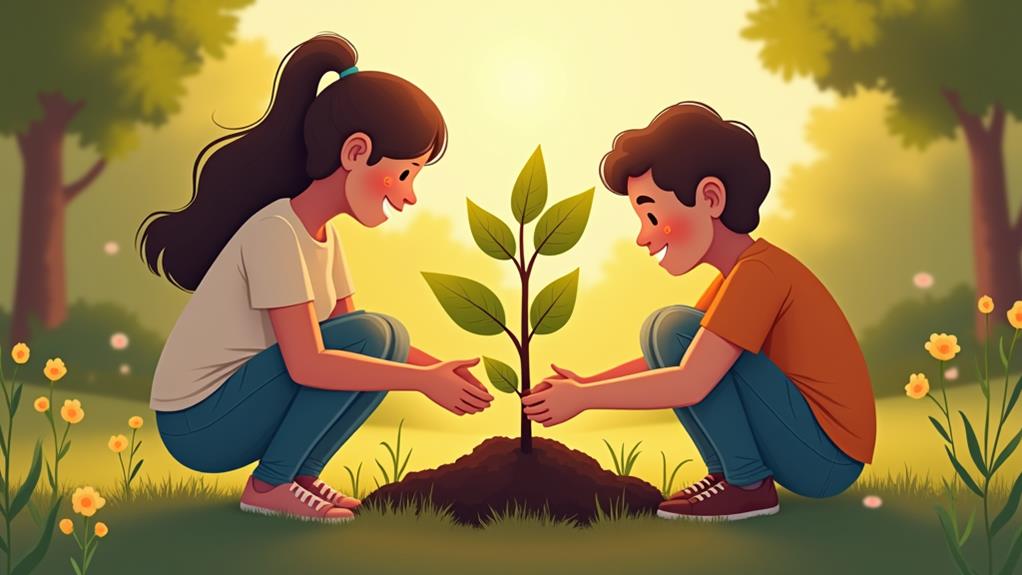
When you use supportive words elevate friendship quality, you’re not just speaking; you’re actively constructing a stronger, more resilient bond. Affirmations and empathetic listening validate feelings and foster an environment of mutual respect and understanding. This boosts self-esteem and happiness, while reducing feelings of loneliness.
Through such positive communication, you cultivate a safe space that enhances both your mental well-being and that of your friend. You’ll find a noticeable lift in the quality of these relationships, as these efforts are reciprocated, leading to a significant, joyful, and supportive connection. Exploring further, you might uncover additional strategies to strengthen these essential bonds.
Key Takeaways
- Supportive words foster emotional safety, enhancing trust and openness within friendships.
- Affirming language boosts self-esteem and confidence, strengthening the bond between friends.
- Verbal expressions of support help alleviate stress, reducing feelings of loneliness and isolation.
- Empathetic listening and validation of feelings deepen mutual respect and understanding in relationships.
- Consistent supportive communication nurtures long-lasting friendships by reinforcing a sense of belonging and connection.
Defining Supportive Friendships
Supportive friendships, the cornerstone of our social lives, flourish on mutual respect, care, and understanding. These relationships, marked not only by spending time together but by sharing genuine affection, loyalty, and honesty, form the foundation of your emotional landscape. What distinguishes these friendships is the quality of the connection—where every friend feels valued and understood.
When you reflect on the friendships that enrich your life, consider how essential active listening and open communication are in these dynamics. They aren’t just about having someone to hang out with; they’re about having someone who supports you emotionally. This support manifests through actions like being there during tough times without judgment, offering a shoulder to lean on, and always working to understand your perspective.
Such quality friendships profoundly influence your overall well-being. They do more than just reduce feelings of stress and loneliness; they actively contribute to your mental health. The mutual respect you share with these friends ensures that you aren’t alone in your journey through life, providing a sense of belonging and validation that’s crucial for anyone’s emotional health.
Benefits of Emotional Support

When friends offer emotional support, your self-esteem often skyrockets, significantly enhancing your overall well-being. These moments, filled with supportive words and understanding, not only alleviate immediate stress but also strengthen your mental health outcomes over time. You’ll notice that the loneliness that once gnawed at your edges begins to dissipate, replaced by a comforting sense of belonging and connection.
This isn’t just about feeling better in the moment—though that’s certainly a significant part. It’s also about the deeper, more enduring effects of knowing you’re valued and understood. Supportive words from friends act as positive affirmations, reinforcing your worth and capabilities. They help solidify the bonds of friendship, fostering a mutual sense of trust and loyalty that’s both rare and precious.
This emotional support, rooted in empathy and care, doesn’t just elevate friendship quality; it transforms it.
As these bonds strengthen, you’ll find that your ability to navigate life’s challenges improves. The encouragement and validation provided by friends guarantee you’re not just surviving but thriving. In every sense, emotional support enriches your life, creating a safe harbor amidst the turbulent seas of daily challenges.
Expressing Support Through Words

When you use verbal affirmations effectively, you’re not just talking; you’re fortifying the bonds that underpin your friendships. Maneuvering the challenges of conversation requires tact and sensitivity, especially when emotions run high.
Verbal Affirmations Strengthen Bonds
Have you ever wondered how simple words like “thank you” or “you’ve got this” can greatly enhance the quality of your friendships? When you voice your appreciation or encouragement, you’re not just passing a message—you’re strengthening the emotional bond that underpins your friendship. Verbal affirmations are more than mere words; they’re pivotal tools that foster trust, empathy, and understanding between friends.
By acknowledging and validating your friend’s feelings, you deepen the quality of your relationship. This is because empathy is at the heart of connection. When you say, “I believe in you” or “I’m here for you,” you’re offering more than comfort; you’re reinforcing their worth and your commitment to the friendship. It shows you care and are willing to support them, come what may.
This act of expressing support isn’t just about boosting their morale; it’s about cultivating a safe space where mutual respect and understanding thrive. Each verbal affirmation you give fortifies the foundation of your friendship, making each bond not only stronger but also richer.
In handling conversational challenges, it’s vital to remember that the words you choose can greatly enhance the quality of your friendships. As you navigate these challenges, using verbal expressions of support like acknowledgment, encouragement, and validation not only deepens bonds but also fosters trust. This trust is essential for building a lasting emotional connection with your friends.
Supportive words are powerful tools in effective communication. They help you express empathy and understanding, which in turn, leads to increased feelings of closeness. Whether you’re resolving conflicts or providing comfort, the right words make your friends feel heard, valued, and appreciated.
It’s about more than just choosing what to say; it’s about affirming their feelings and experiences, reinforcing that they matter to you.
Impact of Empathetic Listening
Building on the idea that supportive words strengthen friendships, empathetic listening emerges as a key element in expressing support through words. When you actively engage with a friend’s emotions and experiences, you’re not just hearing them; you’re deeply understanding and validating their feelings. This process isn’t merely about the words you choose; it’s about the genuine presence and attention you dedicate to their experiences.
Empathetic listening does more than improve friendship quality; it forges stronger emotional connections. By saying things like “I understand how you feel” or “You’re not alone,” you provide a safe space for your friends to express themselves without fear of judgment. This kind of support can notably elevate the trust and intimacy within your friendships.
Moreover, research underscores the importance of empathetic listening in strengthening bonds. It’s a clear indicator that your friendship is built on a foundation of care and mutual respect.
Every nod, every responsive gesture, and every supportive word contributes to a deeper, more meaningful relationship.
Impact on Mental Well-being

When you engage in friendships that are abundant with supportive words, you’re not just building stronger connections; you’re actively enhancing your emotional stability. This kind of interaction greatly reduces your risk of feeling lonely, which is essential in maintaining your mental health. Additionally, the happiness levels you experience can soar, demonstrating just how influential positive verbal exchanges can be in your daily life.
Enhancing Emotional Stability
Supportive words from friends often serve as lifelines, significantly enhancing your emotional stability by alleviating stress and anxiety. When friends actively listen and respond empathetically, it not only shows they care but also solidifies your sense of security. This validation is pivotal as it fosters a safe space where you can express your vulnerabilities without fear of judgment.
Imagine your self-esteem as a building in construction—supportive words act like steel beams that reinforce its structure. Each validating comment from a friend boosts your confidence, layer by layer, ensuring the foundation of your mental well-being is robust.
This continuous reinforcement helps you navigate life’s challenges with more resilience.
Moreover, the impact of these words goes beyond momentary comfort. Over time, consistent emotional support helps you develop a healthier outlook on life, enhancing your overall happiness. The safety net of understanding and support provided by friends means you’re less likely to spiral into negative thought patterns, thereby maintaining a more stable emotional landscape.
Thus, never underestimate the power of a few kind words; they can transform your mental landscape, turning fleeting moments of support into pillars of lasting emotional stability.
Reducing Loneliness Risk
Many people experience a significant reduction in loneliness when their friendships are marked by supportive words and positive communication. This isn’t just about feeling less isolated; it’s about enhancing your mental well-being. Supportive words from friends don’t just echo in the moment; they resonate, reducing your loneliness risk and improving friendship quality.
When you hear affirming words, it’s not merely a boost to your day. These interactions foster a deeper sense of belonging, critically countering the negative impacts of loneliness on your mental health. This emotional support is pivotal, as studies confirm that such positive engagements lead to substantially better mental health outcomes. It’s about building a safety net of empathy and understanding that shields you from the harshness of isolation.
Think about it: every message of encouragement, every understanding nod, not only strengthens the bond but also fortifies your mental resilience. You’re not just sharing moments—you’re weaving a web of emotional security that supports both of you. This mutual exchange enhances the quality of your friendships and, by extension, your overall well-being. So, cherish these words and recognize their power in transforming not just moments, but lives.
Boosting Happiness Levels
If you’re seeking a more joyful life, consider the profound impact that supportive words in your friendships can have on your happiness levels. When friends use affirming language, it not only validates your experiences but also deepens the emotional connection between you. This type of communication enhances your mental well-being by making you feel understood and valued.
Positive verbal exchanges act as a cornerstone for high-quality friendships. They contribute significantly to life satisfaction by fostering an environment of trust and empathy.
When you know you can count on your friends for emotional support, it creates a buffer against the everyday stresses and strains, boosting your overall happiness.
Moreover, expressing care and understanding through words isn’t just about alleviating current woes; it also strengthens the emotional bonds that are crucial for a lasting friendship.
Strategies for Nurturing Friendships

Often, the strength of your friendships hinges on the habits you cultivate in your interactions. To enhance your friendship quality, engaging in active listening is crucial. This means truly hearing what your friends are saying and responding in a way that shows you understand and care. It’s not just about waiting for your turn to speak; it’s about being present and empathetic.
Providing emotional support and validation can greatly strengthen the bond between you and your friends. When they’re going through tough times, your ability to offer comfort without judgment is priceless. This support creates a positive dynamic, making your friends feel safe and valued.
Using encouraging and affirming words regularly can nurture a supportive environment. These expressions contribute to fostering friendships and help in deepening trust. They reassure your friends that they’re appreciated and their achievements are recognized.
Lastly, never underestimate the power of expressing gratitude. Letting your friends know you’re thankful for their presence and contributions to your life not only strengthens existing bonds but also sets a foundation for lasting, supportive, and trusting relationships. Remember, a simple “thank you” can make a big difference.
Recognizing Quality in Relationships

Building on the significance of nurturing habits that enhance friendship quality, it’s equally essential to recognize the hallmarks of these quality relationships.
You’ll find that mutual respect stands as a cornerstone, encouraging a balanced and equitable exchange between friends. This respect manifests not just in grand gestures, but in everyday interactions and understanding.
Central to this dynamic is genuine communication. It’s the kind where you can share your thoughts and feelings openly, without fear of judgment. This communication is authentic, deep, and constructive, fostering an environment where personal growth isn’t just possible, but actively supported.
Quality relationships push you towards your goals, providing a foundation from which you can explore your potential and expand your horizons.
Moreover, surrounding yourself with positive individuals can significantly enhance your mental health and contribute to a fulfilling life. These relationships serve as a buffer against life’s stresses, imbuing your daily existence with joy and resilience.
They’re not just friends; they’re essential components of a well-rounded, supportive network that uplifts you, ensuring that you’re not only surviving but thriving. Recognizing these relationships allows you to cultivate them more consciously, enriching your life immeasurably.
Frequently Asked Questions
Why Is Being Supportive Important in a Friendship?
Being supportive in friendships helps you build trust, strengthen emotional connections, and foster mutual respect. It’s about positive reinforcement, open communication, and cultivating empathy, essential for deep, enduring relationships.
What Are the Factors of a Strong Supportive Friendship?
In a strong supportive friendship, you’ll find trust-building, active listening, and emotional validation essential. Shared experiences deepen bonds, while mutual respect and vulnerability sharing foster a safe, understanding environment that nurtures growth.
Why Is Encouragement Crucial in a Good Friendship?
Encouragement is key in friendships as it boosts confidence, builds trust, and promotes growth. It strengthens bonds by fostering positivity and enhancing communication, making every interaction a brick in the foundation of a resilient, supportive relationship.
How Do You Create a Supportive Environment for Friendship?
To create a supportive friendship environment, you’ll incorporate active listening, open communication, and empathetic responses. Practice emotional validation, mutual respect, and positive reinforcement to deepen understanding and enhance the bond between you and your friends.
Conclusion
In the tapestry of life, friendships are the vibrant threads that hold us together. Just as a lighthouse guides ships through stormy seas, your supportive words can illuminate the dark corners of a friend’s soul, enhancing the bond you share. By choosing to nurture these relationships with care and understanding, you not only uplift others but also fortify your own mental well-being. Remember, the quality of your friendships mirrors the strength of your words.
Take The Next Step, Purchase a Copy
Are you verbalizing defeat and expecting victory? Are you Sabotaging your future? Speak Positive, you are Prophesying the future. Be Positive or Be quiet, A book by Mark E Wilkins. The Audio Book , Kindle and Amazon Paper back are available in French, Spanish and Tagalog. Be sure to buy two copies and give one to a friend, remember you do reap what you sow.
